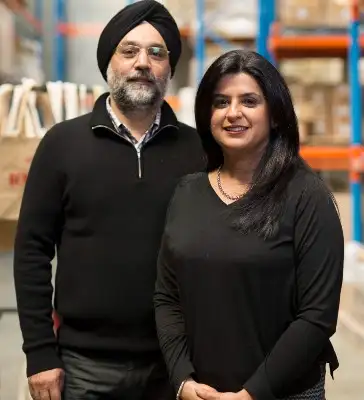
Kiwibank business customer Ecobags provides an alternative to single-use plastic bags and packaging. The business was created in 2005 – 14 years before New Zealand’s ban on plastic bags was introduced.
The husband-and-wife team who founded the business, Jas and Simren Kohli, are on a mission to provide sustainable products, including bags, bin liners, mailers and kitchen essentials, that enable Kiwi to transition away from single-use plastics.
Having created the company years before competitors joined the market, Ecobags still dominates with a 55% market share of the compostable rubbish bag category in New Zealand.
“The biggest challenge to our business since we started has been Covid because of supply chain disruptions. But that taught us how to forecast and change the parameters to manage other unforeseeable issues – like today’s rise in interest rates and inflation,” Director and Co-founder Jas Kohli said.
The couple put their learnings into practise during the current economic volatility and Jas says even in the 2008 recession, their company came out through the other side better off.
“We had recessionary challenges in 2007 and 2008 and we came out stronger because a lot of our competitors didn’t make it. We also have a very varied customer base, so not all our customers are impacted at the same rate,” he said.
Jas offered his top tips on how to survive and thrive during challenging times.
Steps to thrive
-
1Tahi
Cost cutting
When high inflation and increased interest rates kick in, work out how much can be passed onto the consumer and how much the business can absorb. We absorbed part of that cost by buying in bulk, buying from cheaper suppliers overseas and working on a lean operating model within our workplace.
-
2Rua
Positive cash flow
A good positive cash flow is important. When you don’t need to borrow so much, the interest on borrowing is less. We've used this strategy since Covid challenges in 2020. We have managed to absorb quite a lot of our increased costs into our budget, but we've also had to increase prices slightly to pass some of that cost on.
-
3Toru
Diverse product lines
Every time we get hit by a recession, we get stronger because some of our competitors can’t hold on. So, that keeps us going. And if one product drops in sales, another often picks up, so we make sure to have a broad base offering. Having a diverse product line has also created our very diverse customer base, who are not all impacted at the same rate during a recession.
-
4Whā
Keep innovating
We’ve never stopped innovating, so we keep ahead of the market. We have a 55% market share of the compostable rubbish bag category in supermarkets, which is a substantial lead over our competitors. Our philosophy has always been sustainability and we’re always innovating and bringing in more sustainable products.
We also regularly undertake internal audits on our materials and do carbon measuring to continue to analyse how we can reduce our footprint. One of our key challenges has been working around government regulations. Keeping on top of new regulations and staying agile to adjust to how the ministry feels about different materials is a big job.
We've recently come up with recycled ocean-bound plastic bags, aimed at the prevention of waste going into the ocean. The plastic is collected from coastlines and waterways leading out to sea and used to create new product. These bags have recently launched and we’re making other products from this ocean-bound plastic too.
-
5Rima
Expanding market share
We’re planning to start operations in Australia by mid 2023. We already operate overseas in Fiji and the Pacific Islands, and we sell through Amazon in Australia. Our Amazon sales in Australia have done very well, which has encouraged us to enter that market. The Australian consumer is very similar to the Kiwi consumer, so we should have a great market there.
-
6Ono
Banking relationship
We like having regular meetings with our Kiwibank relationship manager and if we do need any financial forecasts or extra funding, they always move fast to help us. They held our hands during a transition from another bank, which made the whole process seamless.
Talk to us
If you want to talk through your business borrowing options, get in touch with our business banking team.
Find a business banking specialist
Find a business banking specialist in your area. Request a call back, or call them directly.
Find a business bankerCall us
Call our business banking team on 0800 601 601, or +64 4 803 1646 if you’re calling from overseas.
Mon – Fri: 8am – 5pm.
You might also be interested in...
This page provides general information and isn't intended as regulated financial advice. To review your specific situation and financial requirements please talk to one of our Business Banking specialists or your Financial Adviser.